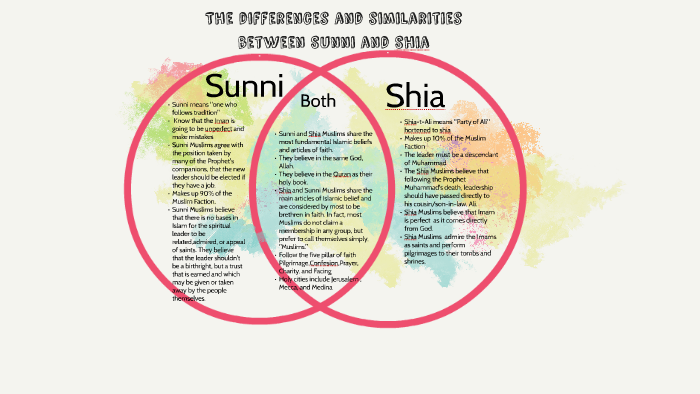
As a result there are many Sunni imams in a given time and place. From that early division a host of further distinctions grew up but.

Questions of Hereditary.
Sunni shiite differences chart. Sunni and Shia - Comparison Chart. Position - Muslim Women Are Equal. Position - Muslim Women Are Not Equal.
Excerpts from the Holy Quran. The Turban and Five Ks of Sikhism. Answers to Judaism-Christianity-Islam Game.
The Sunnis are so named because they believe themselves to follow the sunnah or custom of the Prophet. Shia Muslims or Shiites are those Muslims who followed Ali the closest relative of Muhammad as Muhammads successor. The following chart compares some basic facts about Shia and Sunni Islam.
The Sunnis are so named because they believe themselves to follow the sunnah or custom of the Prophet. Shiites are those Muslims who followed Ali the closest relative of Muhammad as Muhammads successor. Sufi Islam is not exactly a sect but the mystical expression of Islam.
It is therefore not included in the chart below. Main Differences Between Shia and Sunni. In the Islamic world Shia Muslims can be found in Iran Iraq Syria Yemen Bahrain etc.
And Sunni Muslims can be found in every major Muslim country and they are about 90 of the whole Muslim society. According to Shia people after the prophets death his cousin and son-in-law Ali should have been the rightful leader and the fact that leadership. What are the differences between Sunnis and Shiites.
Their beliefs over who should have succeeded the Prophet Muhammad is the key theological difference between the two. Sunnis also have a. Both sects consider themselves Muslims and their beliefs symbols and religious practices are very similar but there are a few important differences between them.
Questions of Hereditary. Shiite clerics can issue innovative religious rulings around controversial modern practices like assisted reproductive technologies or cloning. Shiite Islams most senior ayatollahs for example have largely given their religious approval to embryo donation sperm donation and surrogacy.
In contrast Sunni clerics are more concerned with scholarly consensus around new interpretation of. Sunni and Shiite Islam Similarities and Differences Opening. Sunni and Shiite Islam Similarities and Differences.
Opening Question and Focus What do you know about Shiite Islam and Shiites. What makes them a distinct group within Islam. 1 minute What does it mean to be Shiite.
Origins of word. Shiat Ali Followers of Ali. Sunni judges are known to follow Islamic law to the letter.
Shiite judges are known for being more lenient in interpreting the law. Citation needed Shiite law refuses to accept traditions not transmitted through Ali or one of his descendants. Reject the doctrine of ijma coming to a decision by consensus.
Law can only be interpreted by the Imams of the House of Ali. To see more differences in Shia and Sunni hadith collections visit this Wikipedia category and its subcategories. Day of Ashura Holiday On the Day of Ashura Muslims both Sunni and Shia mourn the martyrdom of Husayn ibn Ali who was Alis son and Muhammads grandson.
Because Shia Muslims put emphasis on Muhammads bloodline the Day of Ashura is often seen as a more important holy day for Shia Islam than Sunni. Sunni scholars say that Imam or Caliph as they prefer to say can be either elected or nominated by the preceding Caliph or selected by a committee or may attempt to gain the power through a military coup as was in the case of Muawiyah. The Shia scholars say that a divinely appointed Imam is sinless and.
Allah does not grant such position to the sinful. The Sunni scholars including. The Sunni position is that the Prophet nominated no successor and that spiritual-moral authority belongs to those who are learned in matters of religious law.
As a result there are many Sunni imams in a given time and place. But others believed that the Prophet had designated his cousin and son-in-law Ali as his successor. From that early division a host of further distinctions grew up but.
What are the main differences between Sunni and Shia. The primary difference in practice comes in that Sunni Muslims mainly rely on the Sunnah a record of the teachings and sayings of the Prophet Muhammad to guide their actions while the Shiites more heavily on their ayatollahs whom they see as a sign of God on earth. Paradise and Hell on the day of judgment.
Redemption dependent on faith in Allah. Redemption is based on the mercy of Allah. Guaranteed paradise if they follow the rules of Muhammad and the twelve Imams.
In 2014 Professor Cole summed up the differences between Sunni and Shiite this way. Shiites are more like traditional Catholics in venerating members of.